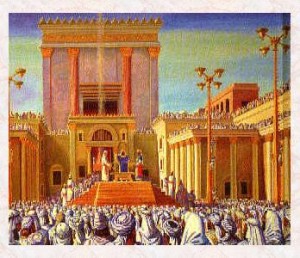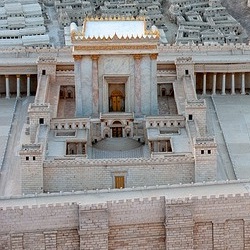Is there a connection between miracles and the Messiah’s coming?
Preface to this question:
From Maimonides, Laws of Kings 11:4 –
If a king will arise from the House of David who diligently contemplates the Torah and observes its mitzvot [commandments] as prescribed by the Written Law and the Oral Law as David, his ancestor, will compel all of Israel to walk in (the way of the Torah) and rectify the breaches in its observance, and fight the wars of G-d, we may, with assurance, consider him Mashiach [the “anointed one,” which is the word in Hebrew word for “Messiah”].
If he succeeds in the above, builds the Temple in its place, and gathers the dispersed of Israel, he is definitely the Mashiach.
He will then improve the entire world, motivating all the nations to serve G-d together, as Tzephaniah 3:9 states: ‘I will transform the peoples to a purer language that they all will call upon the name of G-d and serve Him with one purpose.’
If he did not succeed to this degree or was killed, he surely is not the redeemer promised by the Torah. Rather, he should be considered as all the other proper and complete kings of the Davidic dynasty who died. G-d caused him to arise only to test the many, as Daniel 11:35 states: ‘And some of the wise men will stumble, to try them, to refine, and to clarify until the appointed time, because the set time is in the future.’
The following is presented with permission of Sichos in English, from their book “As a New Day Breaks” and their web page of the chapter “Will Mashiach Work Miracles?”, at https://www.sie.org/library/article_cdo/aid/2468567/jewish/Will-Mashiach-Work-Miracles.htm
Will Mashiach Work Miracles?
This is a question concerning which there is a difference of opinion among our Sages. Our prophets say,[1] “As in the days of your exodus from Egypt, I will show you wonders,” implying that the exodus from Egypt serves as the archetype for redemption, and that the future Redemption will also be characterized by great miracles. Similarly, we find many prophecies of Mashiach’s coming, e.g., “a wolf will dwell with the lamb,” (Isaiah 11:6) which clearly point to a fundamental change in the natural order.

In the Talmud, however, there is a difference of opinion about the matter. Rabbi Chiya bar Abba says the prophets’ words are to be understood literally and the Era of the Redemption will be characterized by miracles. Another Sage, Shmuel, differs, stating: “There is no difference between the current age and the Era of Mashiach except the subjugation [of Israel] to the [Gentile] kingdoms.”
According to this view, as explained by Maimonides (Laws of Kings 12:1) the prophets’ statements are merely allegories used to describe the changes that will occur at that time. For example, in the prophecy cited above, the “wolf” represents the gentile nations, and the “lamb” the Jewish people; in the Era of the Redemption, the Jews will live at peace with the gentiles. Similarly, in regard to the Era of Redemption as a whole: its advent will bring about a transition in every phase of our lives. Nevertheless, the natural order will not be upset.
Mashiach as an individual
Maimonides makes similar statements regarding Mashiach as an individual (Laws of Kings 11:3):
One should not entertain the notion that the King Mashiach must work miracles and wonders, bring about new phenomena within the world, resurrect the dead, or perform other similar deeds. This is [definitely] not true.
A proof can be brought from the fact that Rabbi Akiva, one of the greatest Sages of the Mishnah, supported King Ben Koziva [2], and would describe him as the King Mashiach…. The Sages did not ask him for any signs or wonders.
Maimonides continues (loc. cit.) focusing on “the main thrust of the matter: This Torah, with its statutes and laws, is everlasting”; i.e., his conception of Mashiach is that of a Torah leader, not a miracle worker.
There are other great Rabbis who advanced the opinion that the Era of the Redemption will be characterized by miracles. Similarly, in regard to Mashiach, they posit that he will prove his identity by performing wonders. Significantly, in another text (Iggeres Taiman), Maimonides himself mentions the possibility of Mashiach coming in a miraculous manner.
In subsequent generations, the Rabbis have tried to resolve these two views, explaining that Maimonides also believes there will come a time when the natural order will give way to a miraculous frame of reference. For Maimonides lists as the last of his Thirteen Principles of Faith, belief in the Resurrection of the Dead; this surely represents a drastic deviation from the natural order.
Thus these authorities explain that, according to Maimonides, there will be two periods in the Era of the Redemption: one directly following the coming of Mashiach in which the current natural order will continue to prevail, and a subsequent period of miraculous occurrences, including the Resurrection of the Dead.
A philosophical perspective
From a philosophic perspective, we can appreciate the necessity for two periods. In the Era of the Redemption it will be revealed that our world is a dwelling for G-d. Were it necessary for the Era of the Redemption to involve miracles, this would seem to imply that the world as it exists in its present form could not, Heaven forbid, serve as such a dwelling. It would thus appear that the natural order stands in opposition to the manifestation of His presence. Therefore the Era of the Redemption will include a period when the natural order remains and yet, “the occupation of the entire world will be solely to know G-d.” (Laws of Kings 12:5)
In this framework, Mashiach’s goal will be to initiate a new age of understanding and knowledge. To do this, he will be a teacher and leader. The wonders he works must be within people’s minds, not necessarily within the world at large.
The concept of the world as G-d’s dwelling, however, leads to a further concept. Just as a person expresses himself freely in his own home, G-d’s essence will be revealed within our material world. This implies the revelation, not only of the limited dimensions of G-dliness that can be enclothed within the confines of the natural order, but also the expression of transcendent aspects of G-dliness whose manifestation will nullify that natural order. These transcendent qualities will be revealed in the second period of the Era of the Redemption.[3]

Footnotes:
[1] Michah 7:15. See the booklet entitled “I Will Show You Wonders” (Sichos In English, 1991), which associates this verse with miracles that occurred during the Jewish year 5751 (1991-1992), and explains that they served as a harbinger of Redemption.
[2] [The given name of the Jewish leader known as] “Bar Kochba”. Rabbi Akiva’s support of Bar Kochba [during his military revolt against the Romans] is significant in another context. The fact that Rabbi Akiva applied the title Mashiach to Bar Kochba [who was in the royal dynasty of King David], although he had not yet liberated Israel from the Romans or rebuilt the Temple indicates that a person can be called Mashiach although the Redemption is not yet a fait accompli. Similarly, in subsequent generations, our nation’s Torah leaders have looked to particular individuals as having the potential to be Mashiach. [Tractate Sanhedrin 98b]
[3] There is, nevertheless, the possibility that even the initial phases of Mashiach’s coming will be accompanied by miracles. We are referring to the following Talmudic concept (Sanhedrin 98a):
It is written (Daniel 7:13), “Behold, one like a son of man came on the clouds of heaven”; however, it is also written (Zechariah 9:9), “[Your king will come…] like a poor man riding on a donkey.” If [mankind is found worthy,] he will come “on the clouds of heaven.” If we are not found worthy, he will come “like a poor man riding on a donkey.”
Thus man’s virtue, or lack of it, will determine whether Mashiach will come in a transcendent, miraculous manner or will follow the slow, but steady path of a donkey’s progress.
